By Matt Applegate · Thursday, March 13, 2014 As an occasional feature on TELOSscope, we highlight a past Telos article whose critical insights continue to illuminate our thinking and challenge our assumptions. Today, Matt Applegate looks at Paul Piccone’s “Students’ Protest, Class-Structure, and Ideology” from Telos 3 (Spring 1969).
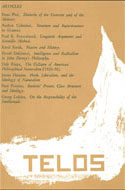 Paul Piccone’s 1969 essay “Students’ Protest, Class-Structure, and Ideology” captures the revolutionary ethos of that time in the United States. Hippies, student politics, Black Power, as well as the work of such figures as Régis Debray and Herbert Marcuse all come under Piccone’s earnest critical consideration. His primary concern, however, is the link between these student revolts and the state of education in the United States. On the one hand, Piccone is intent on charting the means by which hyper-industrialization and the technologization of work lead to open student rebellion. On the other, he is interested in understanding why student rebellion is effective in relation to other forms of revolutionary organization that appear alongside it. Paul Piccone’s 1969 essay “Students’ Protest, Class-Structure, and Ideology” captures the revolutionary ethos of that time in the United States. Hippies, student politics, Black Power, as well as the work of such figures as Régis Debray and Herbert Marcuse all come under Piccone’s earnest critical consideration. His primary concern, however, is the link between these student revolts and the state of education in the United States. On the one hand, Piccone is intent on charting the means by which hyper-industrialization and the technologization of work lead to open student rebellion. On the other, he is interested in understanding why student rebellion is effective in relation to other forms of revolutionary organization that appear alongside it.
Continue reading →
By Maja Sidzinska · Thursday, October 17, 2013 As an occasional feature on TELOSscope, we highlight a past Telos article whose critical insights continue to illuminate our thinking and challenge our assumptions. Today, Maja Sidzinska looks at James Kalb’s “Understanding Conservatism and Tradition,” from Telos 124 (Summer 2002).
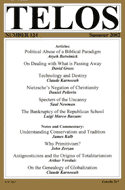 Let’s start with the punch-line: James Kalb informs us, in his article “Understanding Conservatism and Tradition,” that “the modern emphasis is too much on technology, on breaking things down to their simplest parts and reconstructing them in accord with human will. The problem with applying that approach to human life as a whole is that one can make sense of one’s actions only by reference to standards and realities one does not create” (164). In Kalb’s view, tradition creates these standards and realities, and is irreplaceable in this role. He compares the role of tradition to the roles of bureaucracy and markets, and he holds these three operative approaches as constitutive of politics, public policy, and life more generally. Let’s start with the punch-line: James Kalb informs us, in his article “Understanding Conservatism and Tradition,” that “the modern emphasis is too much on technology, on breaking things down to their simplest parts and reconstructing them in accord with human will. The problem with applying that approach to human life as a whole is that one can make sense of one’s actions only by reference to standards and realities one does not create” (164). In Kalb’s view, tradition creates these standards and realities, and is irreplaceable in this role. He compares the role of tradition to the roles of bureaucracy and markets, and he holds these three operative approaches as constitutive of politics, public policy, and life more generally.
Continue reading →
By Johanna K. Schenner · Tuesday, October 8, 2013 As an occasional feature on TELOSscope, we highlight a past Telos article whose critical insights continue to illuminate our thinking and challenge our assumptions. Today, Johanna Schenner looks at Alain de Benoist’s “The End of the Left-Right Dichotomy: The French Case,” from Telos 102 (Winter 1995).
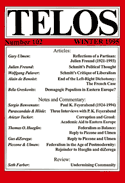 In his article “The End of the Left-Right Dichotomy: The French Case,” Alain de Benoist points to the gradual disappearance of traditional political ideologies in both socialist and conservative parties. In fact, Sofres Polls support this statement: in March 1981, 33% of the population viewed this delineation as outdated; in February 1986, 45% of the population shared this view; in March 1988, this proportion reached a new record level of 48%; and eventually in November 1989, more than half of the French population deemed this ideological antagonism as obsolete (73). In his article “The End of the Left-Right Dichotomy: The French Case,” Alain de Benoist points to the gradual disappearance of traditional political ideologies in both socialist and conservative parties. In fact, Sofres Polls support this statement: in March 1981, 33% of the population viewed this delineation as outdated; in February 1986, 45% of the population shared this view; in March 1988, this proportion reached a new record level of 48%; and eventually in November 1989, more than half of the French population deemed this ideological antagonism as obsolete (73).
Continue reading →
By Linas Jokubaitis · Thursday, September 26, 2013 As an occasional feature on TELOSscope, we highlight a past Telos article whose critical insights continue to illuminate our thinking and challenge our assumptions. Today, Linas Jokubaitis looks at Paul Piccone’s “Lukács’s History and Class Consciousness Half a Century Later,” from Telos 4 (Fall 1969).
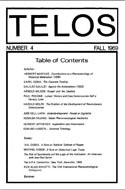 In 1969, when Paul Piccone wrote “Lukács’s History and Class Consciousness Half a Century Later,” almost fifty years had passed since the publication of Georg Lukács’s magnum opus. Piccone wrote this essay to mark that anniversary, and he argued that this work was an “underground classic.” Moreover, he asserted that this book was essential for any analysis of modern thought. According to Piccone, everyone attempting to understand and overcome the ideological crisis of Marxism would be wise to consult this book. In 1969, when Paul Piccone wrote “Lukács’s History and Class Consciousness Half a Century Later,” almost fifty years had passed since the publication of Georg Lukács’s magnum opus. Piccone wrote this essay to mark that anniversary, and he argued that this work was an “underground classic.” Moreover, he asserted that this book was essential for any analysis of modern thought. According to Piccone, everyone attempting to understand and overcome the ideological crisis of Marxism would be wise to consult this book.
Continue reading →
By Danilo Breschi · Thursday, July 25, 2013 Danilo Breschi’s “From Politics to Lifestyle and/or Anti-Politics: Political Culture and the Sense for the State in Post-Communist Italy” appears in Telos 163 (Summer 2013). Read the full version online at the Telos Online website, or purchase a print copy of the issue in our store.
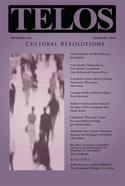 In Italy, the transition from communism to post-communism, from the PCI to today’s Democratic Party, has been determined and strongly influenced not only by the collapse of ideologies and by the changes in the international political scene after 1989, but also by the profound changes that have invested the customs, lifestyles, and collective mentality from the end of the 1960s and, ever more rapidly, from the 1970s. Mass individualism and consumer society are the factors that more than others have undermined the myth of the anthropological “diversity” and the claim to moral superiority cultivated for decades by the Italian communists. Moreover, they help explain the passage of many of them from the utopia revolutionary and the dream of a “new world” to the liberal-bourgeois radicalism that seems to characterize today’s Italian left. Is there anything left of the communist tradition in today’s Italian political and cultural scenario? There is probably one attitude shared by many Communist militants but that belongs to the entire Italian political tradition, i.e., the deeply rooted aversion to public institutions and a poor sense of the state as embodying the rule of law. The greatest and most negative legacy of the long hegemony, on the left, of a communist party narrowly loyal to the Soviet Union was and still is the lack of legitimacy of the state and its institutions. The Soviet experiment having failed, there remains a populist cultural capital that has passed on to the Lega Nord in the 1990s and that has recently migrated to the Five Stars Movement of Beppe Grillo. In Italy, the transition from communism to post-communism, from the PCI to today’s Democratic Party, has been determined and strongly influenced not only by the collapse of ideologies and by the changes in the international political scene after 1989, but also by the profound changes that have invested the customs, lifestyles, and collective mentality from the end of the 1960s and, ever more rapidly, from the 1970s. Mass individualism and consumer society are the factors that more than others have undermined the myth of the anthropological “diversity” and the claim to moral superiority cultivated for decades by the Italian communists. Moreover, they help explain the passage of many of them from the utopia revolutionary and the dream of a “new world” to the liberal-bourgeois radicalism that seems to characterize today’s Italian left. Is there anything left of the communist tradition in today’s Italian political and cultural scenario? There is probably one attitude shared by many Communist militants but that belongs to the entire Italian political tradition, i.e., the deeply rooted aversion to public institutions and a poor sense of the state as embodying the rule of law. The greatest and most negative legacy of the long hegemony, on the left, of a communist party narrowly loyal to the Soviet Union was and still is the lack of legitimacy of the state and its institutions. The Soviet experiment having failed, there remains a populist cultural capital that has passed on to the Lega Nord in the 1990s and that has recently migrated to the Five Stars Movement of Beppe Grillo.
Continue reading →
By Johanna K. Schenner · Tuesday, July 2, 2013 As an occasional feature on TELOSscope, we highlight a past Telos article whose critical insights continue to illuminate our thinking and challenge our assumptions. Today, Johanna Schenner looks at Federico Stame’s “The Crisis of the Left and New Social Identities,” from Telos 60 (Summer 1984).
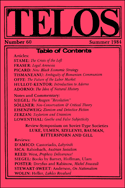 In “The Crisis of the Left and New Social Identities” (1984), Federico Stame addresses the problems encountered by left-wing ideologies and political parties, such as the banality of their demands, as well as deeper underlying issues, such as the falling away of the friend-foe nexus in politics. He also provides hope for improvement by invoking the leading role of new social identities in renewing the tradition of the political Left. In “The Crisis of the Left and New Social Identities” (1984), Federico Stame addresses the problems encountered by left-wing ideologies and political parties, such as the banality of their demands, as well as deeper underlying issues, such as the falling away of the friend-foe nexus in politics. He also provides hope for improvement by invoking the leading role of new social identities in renewing the tradition of the political Left.
Continue reading →
|
|
 Paul Piccone’s 1969 essay “Students’ Protest, Class-Structure, and Ideology” captures the revolutionary ethos of that time in the United States. Hippies, student politics, Black Power, as well as the work of such figures as Régis Debray and Herbert Marcuse all come under Piccone’s earnest critical consideration. His primary concern, however, is the link between these student revolts and the state of education in the United States. On the one hand, Piccone is intent on charting the means by which hyper-industrialization and the technologization of work lead to open student rebellion. On the other, he is interested in understanding why student rebellion is effective in relation to other forms of revolutionary organization that appear alongside it.
Paul Piccone’s 1969 essay “Students’ Protest, Class-Structure, and Ideology” captures the revolutionary ethos of that time in the United States. Hippies, student politics, Black Power, as well as the work of such figures as Régis Debray and Herbert Marcuse all come under Piccone’s earnest critical consideration. His primary concern, however, is the link between these student revolts and the state of education in the United States. On the one hand, Piccone is intent on charting the means by which hyper-industrialization and the technologization of work lead to open student rebellion. On the other, he is interested in understanding why student rebellion is effective in relation to other forms of revolutionary organization that appear alongside it.  Let’s start with the punch-line: James Kalb informs us, in his article “Understanding Conservatism and Tradition,” that “the modern emphasis is too much on technology, on breaking things down to their simplest parts and reconstructing them in accord with human will. The problem with applying that approach to human life as a whole is that one can make sense of one’s actions only by reference to standards and realities one does not create” (164). In Kalb’s view, tradition creates these standards and realities, and is irreplaceable in this role. He compares the role of tradition to the roles of bureaucracy and markets, and he holds these three operative approaches as constitutive of politics, public policy, and life more generally.
Let’s start with the punch-line: James Kalb informs us, in his article “Understanding Conservatism and Tradition,” that “the modern emphasis is too much on technology, on breaking things down to their simplest parts and reconstructing them in accord with human will. The problem with applying that approach to human life as a whole is that one can make sense of one’s actions only by reference to standards and realities one does not create” (164). In Kalb’s view, tradition creates these standards and realities, and is irreplaceable in this role. He compares the role of tradition to the roles of bureaucracy and markets, and he holds these three operative approaches as constitutive of politics, public policy, and life more generally.  In his article
In his article  In 1969, when Paul Piccone wrote “Lukács’s History and Class Consciousness Half a Century Later,” almost fifty years had passed since the publication of Georg Lukács’s magnum opus. Piccone wrote this essay to mark that anniversary, and he argued that this work was an “underground classic.” Moreover, he asserted that this book was essential for any analysis of modern thought. According to Piccone, everyone attempting to understand and overcome the ideological crisis of Marxism would be wise to consult this book.
In 1969, when Paul Piccone wrote “Lukács’s History and Class Consciousness Half a Century Later,” almost fifty years had passed since the publication of Georg Lukács’s magnum opus. Piccone wrote this essay to mark that anniversary, and he argued that this work was an “underground classic.” Moreover, he asserted that this book was essential for any analysis of modern thought. According to Piccone, everyone attempting to understand and overcome the ideological crisis of Marxism would be wise to consult this book.  In Italy, the transition from communism to post-communism, from the PCI to today’s Democratic Party, has been determined and strongly influenced not only by the collapse of ideologies and by the changes in the international political scene after 1989, but also by the profound changes that have invested the customs, lifestyles, and collective mentality from the end of the 1960s and, ever more rapidly, from the 1970s. Mass individualism and consumer society are the factors that more than others have undermined the myth of the anthropological “diversity” and the claim to moral superiority cultivated for decades by the Italian communists. Moreover, they help explain the passage of many of them from the utopia revolutionary and the dream of a “new world” to the liberal-bourgeois radicalism that seems to characterize today’s Italian left. Is there anything left of the communist tradition in today’s Italian political and cultural scenario? There is probably one attitude shared by many Communist militants but that belongs to the entire Italian political tradition, i.e., the deeply rooted aversion to public institutions and a poor sense of the state as embodying the rule of law. The greatest and most negative legacy of the long hegemony, on the left, of a communist party narrowly loyal to the Soviet Union was and still is the lack of legitimacy of the state and its institutions. The Soviet experiment having failed, there remains a populist cultural capital that has passed on to the Lega Nord in the 1990s and that has recently migrated to the Five Stars Movement of Beppe Grillo.
In Italy, the transition from communism to post-communism, from the PCI to today’s Democratic Party, has been determined and strongly influenced not only by the collapse of ideologies and by the changes in the international political scene after 1989, but also by the profound changes that have invested the customs, lifestyles, and collective mentality from the end of the 1960s and, ever more rapidly, from the 1970s. Mass individualism and consumer society are the factors that more than others have undermined the myth of the anthropological “diversity” and the claim to moral superiority cultivated for decades by the Italian communists. Moreover, they help explain the passage of many of them from the utopia revolutionary and the dream of a “new world” to the liberal-bourgeois radicalism that seems to characterize today’s Italian left. Is there anything left of the communist tradition in today’s Italian political and cultural scenario? There is probably one attitude shared by many Communist militants but that belongs to the entire Italian political tradition, i.e., the deeply rooted aversion to public institutions and a poor sense of the state as embodying the rule of law. The greatest and most negative legacy of the long hegemony, on the left, of a communist party narrowly loyal to the Soviet Union was and still is the lack of legitimacy of the state and its institutions. The Soviet experiment having failed, there remains a populist cultural capital that has passed on to the Lega Nord in the 1990s and that has recently migrated to the Five Stars Movement of Beppe Grillo.  In “The Crisis of the Left and New Social Identities” (1984), Federico Stame addresses the problems encountered by left-wing ideologies and political parties, such as the banality of their demands, as well as deeper underlying issues, such as the falling away of the friend-foe nexus in politics. He also provides hope for improvement by invoking the leading role of new social identities in renewing the tradition of the political Left.
In “The Crisis of the Left and New Social Identities” (1984), Federico Stame addresses the problems encountered by left-wing ideologies and political parties, such as the banality of their demands, as well as deeper underlying issues, such as the falling away of the friend-foe nexus in politics. He also provides hope for improvement by invoking the leading role of new social identities in renewing the tradition of the political Left. 






